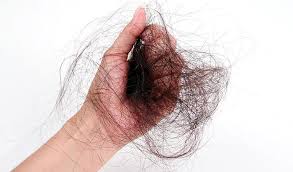Reasone of Hairfall is internal not external
Hair loss is a concern that affects millions of people worldwide, and while external factors like harsh chemicals, styling tools, and environmental pollutants are often blamed, many overlook a crucial internal factor: gut health and nutrition. It turns out that the health of your gut and the nutrients your body absorbs can significantly influence the health of your hair. In this blog, we’ll explore how gut health impacts hair growth, why proper nutrition is essential for maintaining healthy hair, and practical tips for nurturing both your gut and your hair.
LATEST
1. The Gut-Hair Connection: An Overlooked Factor
Your gut is often referred to as your "second brain" due to its intricate network of neurons and its direct influence on various bodily functions. But what does this have to do with your hair? The answer lies in the gut's role in nutrient absorption, hormone regulation, and inflammation control—all of which are crucial for maintaining healthy hair.
When your gut is compromised (a condition known as gut dysbiosis), it can lead to poor nutrient absorption. This can result in deficiencies in essential vitamins and minerals needed for hair growth. Furthermore, an imbalanced gut microbiome can trigger systemic inflammation, which can disrupt the hair growth cycle and even contribute to conditions like alopecia.
2. How Poor Nutrition Affects Hair Health
The nutrients you consume directly impact the health of your hair. Inadequate levels of key vitamins and minerals can cause hair thinning and even hair loss. Here are some important nutrients to focus on:
Biotin (Vitamin B7): Essential for hair growth and strength, biotin deficiency can lead to brittle hair or excessive shedding.
Iron: Low iron levels, often linked to anemia, can cause hair loss, as hair follicles require iron to function properly.
Vitamin D: A deficiency in vitamin D has been associated with hair loss, particularly with conditions like androgenic alopecia.
Zinc: Zinc helps regulate hair follicle function and is critical for healthy hair growth. A lack of zinc can lead to hair thinning and shedding.
Omega-3 Fatty Acids: These healthy fats nourish the scalp and promote hair growth. Omega-3s have anti-inflammatory properties that can help reduce hair loss.
Protein: Hair is made primarily of keratin, a protein. Without enough protein in your diet, your hair may become weak and brittle.
If your gut is not in optimal condition, it may struggle to absorb these nutrients effectively, leaving your hair deprived of the necessary building blocks it needs to thrive.
3. Gut Health and Inflammation: A Hidden Cause of Hair Loss
Gut dysbiosis—an imbalance in the gut microbiome—can increase inflammation in the body. Chronic inflammation has been linked to many forms of hair loss, including telogen effluvium and alopecia areata. When inflammation levels rise, it can disrupt the natural hair growth cycle, causing hair follicles to enter the resting phase prematurely, which leads to shedding.
Additionally, gut-related inflammation may influence the balance of hormones like cortisol, which can impact hair growth. Elevated stress and inflammation can also contribute to the shrinking of hair follicles, making it harder for new hair to grow.
4. The Importance of a Balanced Microbiome for Healthy Hair
Your gut microbiome consists of trillions of bacteria that play a crucial role in maintaining overall health. A healthy microbiome supports proper digestion, strengthens the immune system, and regulates inflammation. However, an imbalance in gut bacteria can lead to digestive issues, immune dysfunction, and increased inflammation—all of which can negatively affect your hair.
To support a healthy gut microbiome, it's essential to:
Eat a variety of fiber-rich foods like fruits, vegetables, whole grains, and legumes, which nourish beneficial gut bacteria.
Consume fermented foods like yogurt, kefir, kimchi, and sauerkraut to introduce probiotics that promote gut health.
Limit processed foods and excess sugar, which can fuel harmful bacteria and promote inflammation in the body.
5. How to Improve Gut Health and Prevent Hair Fall
If you’re experiencing hair loss and suspect that your gut health or nutrition may be contributing to the problem, here are some strategies to support both your gut and your hair:
Focus on gut-friendly foods: Include a variety of fiber-rich foods, fermented foods, and prebiotics to nourish your gut microbiome.
Take a probiotic supplement: Probiotics can help restore balance to your gut and reduce inflammation, which may indirectly support hair growth.
Ensure you’re getting enough of the right nutrients: Aim to get essential vitamins and minerals from whole foods, or consider a high-quality supplement if necessary. Be especially mindful of iron, zinc, biotin, and vitamin D.
Manage stress: Chronic stress negatively impacts both your gut and your hair. Practices like yoga, meditation, and deep breathing exercises can help reduce stress levels and promote overall well-being.
Stay hydrated: Water is essential for digestion and nutrient absorption. Ensure you’re drinking enough water throughout the day to support both your gut and hair health.
6. Consult with a Professional
If your hair loss persists despite improving your diet and gut health, consider consulting with a healthcare professional. A doctor or nutritionist can help identify any underlying conditions (like gut imbalances or nutritional deficiencies) and provide personalized recommendations to address the root causes of your hair loss.
Conclusion
The connection between gut health, nutrition, and hair fall is undeniable. A healthy gut plays a crucial role in nutrient absorption, inflammation regulation, and hormone balance—factors that are vital for hair growth. By nourishing your body with the right nutrients, supporting your gut microbiome, and managing stress, you can create the ideal conditions for healthy, strong hair. If you're struggling with hair loss, addressing the internal causes can help you restore balance and confidence in your hair health.
Take care of your gut, and your hair will thank you!


